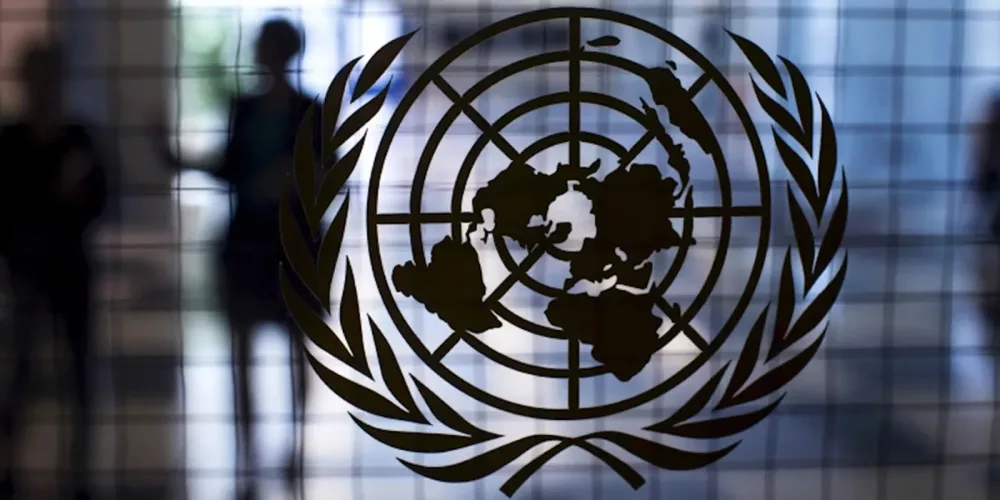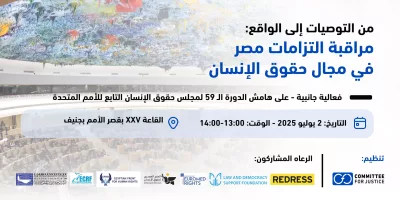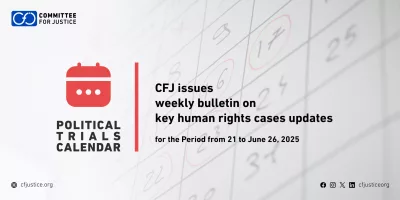The UN High Commissioner for Human Rights issued a report titled “The Impact of Administrative and Security Measures on Human Rights,” which highlighted the complex relationship between government measures aimed at counter-terrorism and national security on the one hand, and the protection of fundamental rights and freedoms on the other.
The UN report seeks to examine the administrative measures taken by states and their impact on fundamental freedoms, focusing on ensuring that these measures align with international human rights laws. The report also points to the challenges related to unjustified restrictions on civic space and the curtailing of freedoms under the pretext of combating terrorism.
The Committee for Justice (CFJ) contributed to the preparation of this report through multiple meetings held with the team from the High Commissioner’s office. During these meetings, the committee provided a comprehensive analysis of the negative impact of administrative measures taken in several countries, based on field reports and testimonies from civil society organizations. The committee also submitted a detailed report to the Commissioner’s office, discussing the legislative and executive mechanisms employed by some governments to restrict fundamental freedoms, revealing the increasing use of blacklists and administrative sanctions against human rights defenders and political dissidents.
One of CFJ’s key contributions was providing updated data and case studies on how these measures affected targeted groups, particularly minorities, migrants, and human rights defenders. The committee also worked closely with the High Commissioner’s office to offer practical recommendations grounded in international human rights law principles, aimed at ensuring a balance between security requirements and the respect for fundamental rights and freedoms.
The UN report noted that some research pointed to a shift in state policies globally from merely responding to terrorism to preventing it. This expansion in preparatory crimes and material support has led to the punishment of individuals for their presumed intentions rather than their actual actions. The expansion of administrative measures in counter-terrorism may undermine the principle of legal certainty.
These administrative measures have had a significant impact on fundamental human rights; some of these measures threatened basic freedoms and contributed to the shrinking of civic space, including, for example, practices of listing individuals on certain blacklists and imposing sanctions.
The report also noted that the Security Council has asked states to establish clear standards and procedures regarding listings, restrictions imposed, and the criteria for known or suspected individuals. It required that these measures comply with domestic and international human rights laws. However, the manner in which administrative measures were implemented has, in practice, impacted human rights, as evidenced by local decisions to prevent individuals from traveling or revoke their passports without judicial review or effective legal challenge.
These measures, in some contexts, targeted human rights defenders, political opponents, and individuals belonging to minorities. In other contexts, executive authorities used counter-terrorism to unjustifiably restrict the freedom of peaceful assembly and expression, implementing other administrative measures such as deprivation of nationality, travel restrictions, and detention.
This was highlighted in CFJ’s report, which noted that in the years following the military coup in 2013, the Egyptian government engaged in a broad and open campaign of repression against civil society, particularly through the application of administrative measures ostensibly aimed at counter-terrorism but which, in practice, suppressed dissenting voices, undermined civil liberties, and strengthened President Sisi’s authoritarian rule in Egypt.
The report further mentioned that over the past decade, politically motivated arbitrary decisions to list individuals on terrorism lists have become commonplace in Egypt. The use of arbitrary and retaliatory listings on terrorism lists against peaceful citizens raises serious concerns about the legal and administrative tools the current Egyptian government employs to suppress freedom of expression and association. This practice reflects the lack of judicial independence and its complicity in silencing opposing voices.
The report concluded with recommendations presented to states and UN mechanisms as follows:
For states:
(a) Ensure that the legal basis for administrative measures is transparent and specific, and that counter-terrorism procedures align with international standards, including the principle of legality, ensuring that the necessary measures are balanced and non-discriminatory.
(b) Guarantee that administrative measures are accompanied by sufficient procedural safeguards, including fair trials, especially when they resemble criminal charges under international human rights law.
(c) Conduct prior assessments of the impact of administrative measures on different groups, focusing on those vulnerable to discrimination, and take measures to address negative impacts such as stigmatization.
(d) Avoid using administrative measures to impose unjustified restrictions on human rights, ensuring they do not exceed criminal law, and involve civil society in the process.
(e) Avoid using legislation as a tool to suppress human rights or shrink civic space unjustifiably, and take steps to remove wrongfully listed entities and ensure effective remedies.
For the UN:
– Encourage UN entities to intensify efforts to promote respect for human rights in counter-terrorism measures and assist states in implementing human rights-compliant administrative measures.
– Enhance technical guidance to member states to ensure independent oversight of administrative measures and prevent their misuse, while protecting civic space.
– Support states in assessing the impact of administrative measures and recommending evidence-based reforms to mitigate their negative effects on human rights.
– Continue UN mechanisms’ engagement with states to correct the adverse effects of administrative measures related to counter-terrorism.






